Egypt is faced with a choice of direction – which one?
Published on
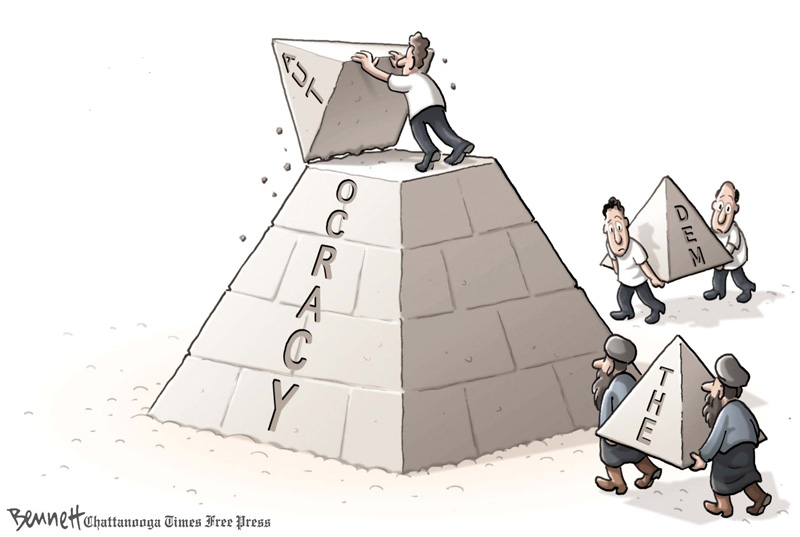
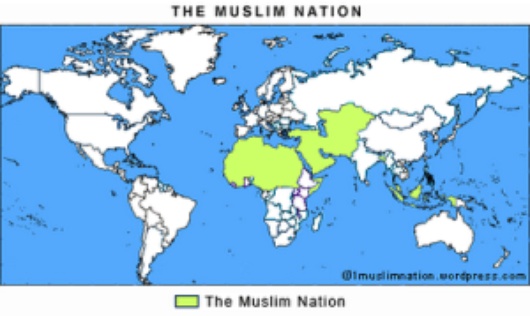 Now
there is a moment for change, I would claim that the status quo is
sooner or later unsustainable in all Arab countries. However in all
probability the roads will differ from country to country. Arab regimes
have a choice: They can either lead a reform process from above or
watch it take place in the streets below, different interest groups on
the street level may implement different agendas.The Egyptian autocrats removed the Internet from Egypt; the Chinese autocrats removed Egypt from the Internet. (an anonymous quote from web forum)
Now
there is a moment for change, I would claim that the status quo is
sooner or later unsustainable in all Arab countries. However in all
probability the roads will differ from country to country. Arab regimes
have a choice: They can either lead a reform process from above or
watch it take place in the streets below, different interest groups on
the street level may implement different agendas.The Egyptian autocrats removed the Internet from Egypt; the Chinese autocrats removed Egypt from the Internet. (an anonymous quote from web forum)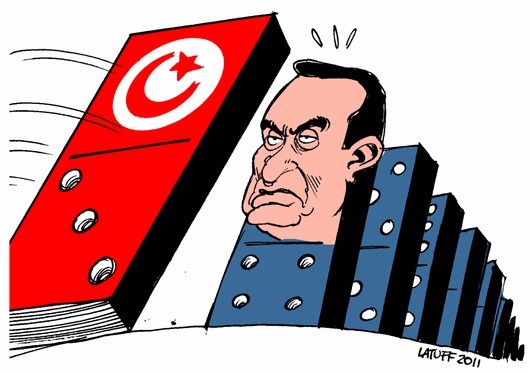 The
popular unrest in the Arab world has even reached Libya. There have
been calls in Libya for demonstrations next week to protest against
Muammar Gaddafi's 41.5-year rule. From social media I have got messages
that especially youth is trying to collect people for 25th
February demonstration but Libya's regime is not waiting escalation
passively – internet is blocked, many prominent bloggers and tweeter are
arrested and related facebook sites hacked. As Gaddafi has iron grip
in country the time for revolution might not have arrived – yet.
The
popular unrest in the Arab world has even reached Libya. There have
been calls in Libya for demonstrations next week to protest against
Muammar Gaddafi's 41.5-year rule. From social media I have got messages
that especially youth is trying to collect people for 25th
February demonstration but Libya's regime is not waiting escalation
passively – internet is blocked, many prominent bloggers and tweeter are
arrested and related facebook sites hacked. As Gaddafi has iron grip
in country the time for revolution might not have arrived – yet. The demonstrators
The workers are the primary instigators of the Egyptian uprising. The April 6 group of young labor activists first came to prominence when they supported strikes by textile factory workers in Mahalla al-Kubra and elsewhere for improved wages and work conditions. There have been more than 3,000 labor actions by Egyptian workers since 2004. The pro-labor youth activists have been among the major leaders of the uprising in the past week, and had pioneered the use of Facebook and Twitter for such purposes. According DEBKAfile large sections of Egypt's economic machinery are shut down by spreading strikes. Although reforms and pay hikes have been pledged by the new Egyptian government, large groups of workers, mainly in Cairo, rebelled against state-appointed managements and set up "Revolutionary Committees" to run factories and other work places, including Egyptian state TV and Egypt's biggest weekly "Ros el-Yusuf." From How to Protest Intelligently -leaflet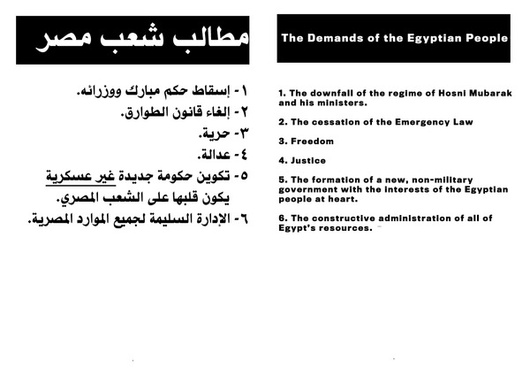 While
some demonstrators may demand for Western-style liberal democracy the
main part of them have their interests with the state of the Egyptian
economy - Egypt’s peasants, workers and merchant class to rise en masse.
The demonstrators are clearly united in opposing Mubarak as an
individual, and to a large extent united in opposing the regime. Beyond
that, there is a deep divide in the opposition and thus far do not
appear to have been able to generate the type of mass movement that
toppled the Shah of Iran’s regime in 1979.From How to Protest Intelligently -leaflet
While
some demonstrators may demand for Western-style liberal democracy the
main part of them have their interests with the state of the Egyptian
economy - Egypt’s peasants, workers and merchant class to rise en masse.
The demonstrators are clearly united in opposing Mubarak as an
individual, and to a large extent united in opposing the regime. Beyond
that, there is a deep divide in the opposition and thus far do not
appear to have been able to generate the type of mass movement that
toppled the Shah of Iran’s regime in 1979.From How to Protest Intelligently -leaflet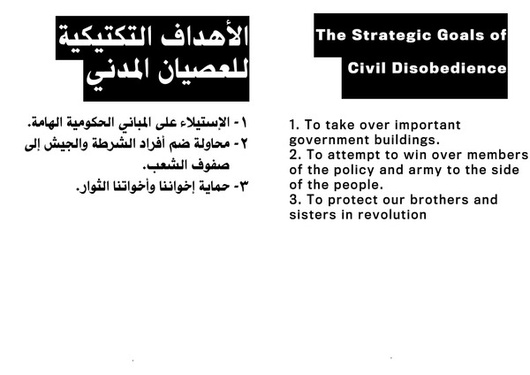 In
social media there is not so many tweets espousing Islamic extremism,
instead there are many of them supporting Socialist/Marxist themes.
Tunisian public rising was clearly against former dictator Ben Ali and
his local and foreign collaborators in the US, Israel, France, Germany
and Italy. In the first post-Ben Ali government of Tunisia at least six
new people of a 17 member cabinet were selected from these groups.
Similar as in Tunisia also Egyptian grassroots big part of political
activists are coming from Socialist/Marxist/Unionist circles. In Egypt
there are some of the more well-known socialists groups involved in
kicking off the January 25th protests (Source and more in The Graph: The Socialist Roots Of The Egyptian Protests ):Kafya/Kefaya
– “The Egyptian Movement for Change” – Translated to English it means
“enough”. It’s made up of socialists, Marxists, (seems ‘Change’ means
the same to them as it did to Barack) secularists and Islamists. Some
see this group as Mubarak’s primary opposition group.
Tagammu – “National Progressive Unionist Party” – a socialist political party in Egypt that rejects religious extremism.
Mahalla/April 6th – a large group of unionists/socialists and their youth supporters.
The Center for Socialist Studies – an Egyptian group in Giza committed to bringing about “revolutionary socialism”.
Nasserites
– mainly Arab nationalism combined with socialism and secularism.
Named after former Egyptian President Gamal Abdel Nasser. These
supporters tended to be older in age and were in much smaller numbers
at the protests, but their worldview is mostly consistent with their
younger counterparts.
In
social media there is not so many tweets espousing Islamic extremism,
instead there are many of them supporting Socialist/Marxist themes.
Tunisian public rising was clearly against former dictator Ben Ali and
his local and foreign collaborators in the US, Israel, France, Germany
and Italy. In the first post-Ben Ali government of Tunisia at least six
new people of a 17 member cabinet were selected from these groups.
Similar as in Tunisia also Egyptian grassroots big part of political
activists are coming from Socialist/Marxist/Unionist circles. In Egypt
there are some of the more well-known socialists groups involved in
kicking off the January 25th protests (Source and more in The Graph: The Socialist Roots Of The Egyptian Protests ):Kafya/Kefaya
– “The Egyptian Movement for Change” – Translated to English it means
“enough”. It’s made up of socialists, Marxists, (seems ‘Change’ means
the same to them as it did to Barack) secularists and Islamists. Some
see this group as Mubarak’s primary opposition group.
Tagammu – “National Progressive Unionist Party” – a socialist political party in Egypt that rejects religious extremism.
Mahalla/April 6th – a large group of unionists/socialists and their youth supporters.
The Center for Socialist Studies – an Egyptian group in Giza committed to bringing about “revolutionary socialism”.
Nasserites
– mainly Arab nationalism combined with socialism and secularism.
Named after former Egyptian President Gamal Abdel Nasser. These
supporters tended to be older in age and were in much smaller numbers
at the protests, but their worldview is mostly consistent with their
younger counterparts.  The
political Islam waits on the sidelines. The Muslim Brotherhood has not
been instrumental in this movement to date. The socialists involved in
the January 25th uprising do not trust the Muslim Brotherhood
politically because they see that group as beholden to Egyptian
capitalism. However, the Brotherhood has money, powerful people who
don’t mind engaging in murder, and years of organization on their side.
If they want to co-opt this movement, they’ll be a force that the
Egyptian neo-Marxists have to deal with. Based on events in Tunisia and
Egypt The Graph concludes thatit’s
clear that the current “revolution” in Africa has more to do with
socialism than it does about Islamic fundamentalism, although the latter
is playing a strong secondary role within some of the factions. Socialism
has very deep roots in the Egypt and the Middle East going back to the
era of Salama Moussa who wrote the first Arabic book on socialism in
1912 titled, “Al-Ishtirākiyya (The Socialism)”. Moussa also helped form Egypt’s Socialist Party (later to be renamed the Communist Party in 1923) in 1921.Protests
have begun in Saudi Arabia, Yemen, Albania, and Jordan and they are
planned to take place also in Syria, Libya and the rest of Arab world.
There may not be a common ideology behind these protests, but e.g. in
Albania the Socialist Party is speaking out against the current
government.
The
political Islam waits on the sidelines. The Muslim Brotherhood has not
been instrumental in this movement to date. The socialists involved in
the January 25th uprising do not trust the Muslim Brotherhood
politically because they see that group as beholden to Egyptian
capitalism. However, the Brotherhood has money, powerful people who
don’t mind engaging in murder, and years of organization on their side.
If they want to co-opt this movement, they’ll be a force that the
Egyptian neo-Marxists have to deal with. Based on events in Tunisia and
Egypt The Graph concludes thatit’s
clear that the current “revolution” in Africa has more to do with
socialism than it does about Islamic fundamentalism, although the latter
is playing a strong secondary role within some of the factions. Socialism
has very deep roots in the Egypt and the Middle East going back to the
era of Salama Moussa who wrote the first Arabic book on socialism in
1912 titled, “Al-Ishtirākiyya (The Socialism)”. Moussa also helped form Egypt’s Socialist Party (later to be renamed the Communist Party in 1923) in 1921.Protests
have begun in Saudi Arabia, Yemen, Albania, and Jordan and they are
planned to take place also in Syria, Libya and the rest of Arab world.
There may not be a common ideology behind these protests, but e.g. in
Albania the Socialist Party is speaking out against the current
government.The Muslim Brotherhood (MB)
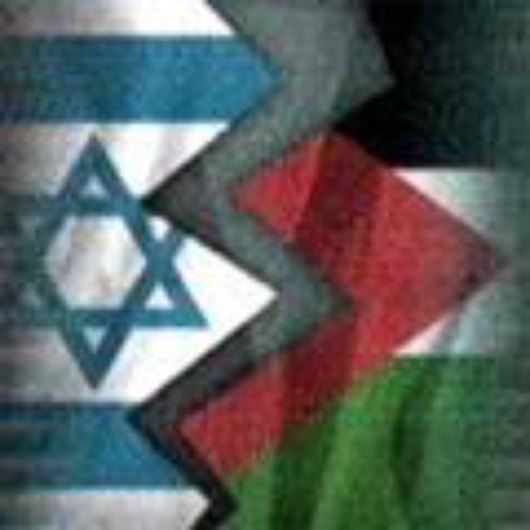 The
Muslim Brotherhood may look so far like bystander; however it is may
get even decisive role with further developments. Though many members of
the MB joined the protests, they maintained a low profile. The group's
traditional slogans were not seen in Tahrir Square. However inside MB
there exists many views. One of them came publicity via Muhammad
Ghanem, representative of Muslim Brotherhood in London, who demanded
civil disobedience but also “Halting Passage through the Suez Canal… and
Preparing for War with Israel”.
Egypt’s
MB always remained a pragmatic organization, true militant Islamists or
jihadist groups are e.g. Tandheem al-Jihad, which was behind Sadat’s
assassination, and Gamaa al-Islamiyah, which led a violent insurgency in
the 1990s responsible for the killings of foreign tourists.
The
Muslim Brotherhood may look so far like bystander; however it is may
get even decisive role with further developments. Though many members of
the MB joined the protests, they maintained a low profile. The group's
traditional slogans were not seen in Tahrir Square. However inside MB
there exists many views. One of them came publicity via Muhammad
Ghanem, representative of Muslim Brotherhood in London, who demanded
civil disobedience but also “Halting Passage through the Suez Canal… and
Preparing for War with Israel”.
Egypt’s
MB always remained a pragmatic organization, true militant Islamists or
jihadist groups are e.g. Tandheem al-Jihad, which was behind Sadat’s
assassination, and Gamaa al-Islamiyah, which led a violent insurgency in
the 1990s responsible for the killings of foreign tourists. 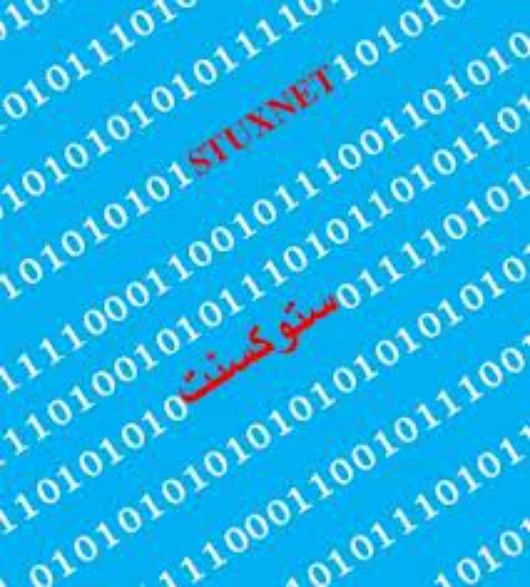 There
is some base to claim that majority of Islamists who are not jihadists
and instead are political forces. The MB is internally divided. It faces
a generational struggle, with an old guard trying to prevent its ideals
from being diluted while a younger generation looks to Turkey’s Justice
and Development Party (AKP) as a role model. The core question –
without clear answer – is if the Muslim Brotherhood will remain a benign
force in the event that it came into power.
The
Muslim Brotherhood has participated to electoral competition and
representation, developed new professional competencies and skills, and
forged closer ties with Egyptian activists, researchers, journalists,
and politicians outside the Islamist camp; indeed the MB could well
evolve to be more like Turkey’s Justice and Development (AK) Party.
In her article What the Brotherhood Is and How it Will Shape the Future published in Foreign Affairs, Carrie Rosefsky Wickham concludes following: It
remains to be seen whether the Brotherhood as an organization -- not
only individual members -- will accept a constitution that does not at
least refer to sharia; respect the rights of all Egyptians to express
their ideas and form parties; clarify its ambiguous positions on the
rights of women and non-Muslims; develop concrete programs to address
the nation's toughest social and economic problems; and apply the same
pragmatism it has shown in the domestic arena to issues of foreign
policy, including relations with Israel and the West. As
Muslim Brotherhood rule is one possible option in future Egypt and to
understand the implications, The Palestinian Media Watch has translated
the important MB book “Jihad is the way” by Mustafa Mashhur, leader of the Muslim Brotherhood in Egypt, 1996-2002. Translation can be found from PMW site.
There
is some base to claim that majority of Islamists who are not jihadists
and instead are political forces. The MB is internally divided. It faces
a generational struggle, with an old guard trying to prevent its ideals
from being diluted while a younger generation looks to Turkey’s Justice
and Development Party (AKP) as a role model. The core question –
without clear answer – is if the Muslim Brotherhood will remain a benign
force in the event that it came into power.
The
Muslim Brotherhood has participated to electoral competition and
representation, developed new professional competencies and skills, and
forged closer ties with Egyptian activists, researchers, journalists,
and politicians outside the Islamist camp; indeed the MB could well
evolve to be more like Turkey’s Justice and Development (AK) Party.
In her article What the Brotherhood Is and How it Will Shape the Future published in Foreign Affairs, Carrie Rosefsky Wickham concludes following: It
remains to be seen whether the Brotherhood as an organization -- not
only individual members -- will accept a constitution that does not at
least refer to sharia; respect the rights of all Egyptians to express
their ideas and form parties; clarify its ambiguous positions on the
rights of women and non-Muslims; develop concrete programs to address
the nation's toughest social and economic problems; and apply the same
pragmatism it has shown in the domestic arena to issues of foreign
policy, including relations with Israel and the West. As
Muslim Brotherhood rule is one possible option in future Egypt and to
understand the implications, The Palestinian Media Watch has translated
the important MB book “Jihad is the way” by Mustafa Mashhur, leader of the Muslim Brotherhood in Egypt, 1996-2002. Translation can be found from PMW site.Non-violent revolution
Anonymous leaflets How to Protest Intelligently - circulating in Cairo also provide practical and tactical advice for mass demonstrations, confronting riot police, and besieging and taking control of government offices. Signed "long live Egypt", the slickly produced 26-page document calls on demonstrators to begin with peaceful protests, carrying roses but no banners, and march on official buildings while persuading policemen and soldiers to join their ranks. The leaflet ask recipients to redistribute it by email and photocopy, but not to use social media such as Facebook and Twitter, which are being monitored by the security forces. Here some translated pages of How to Protest Intelligently: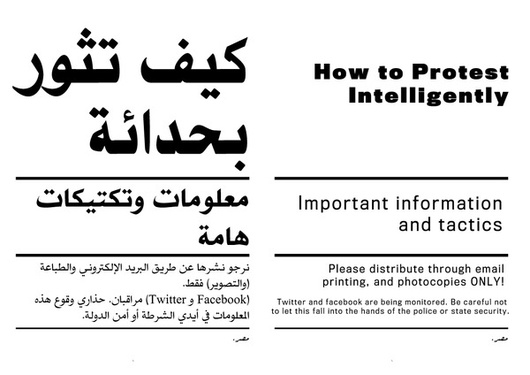
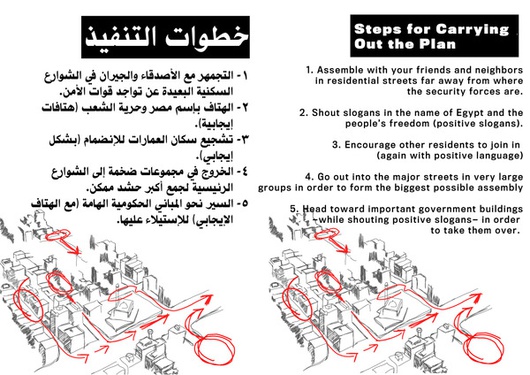
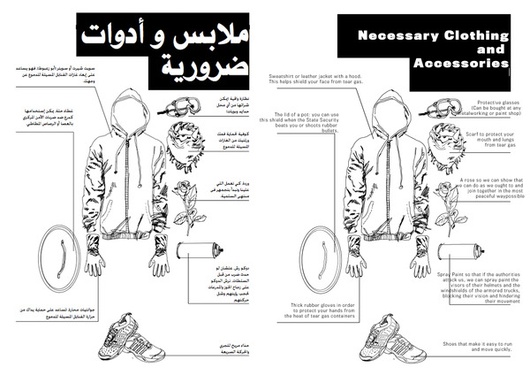
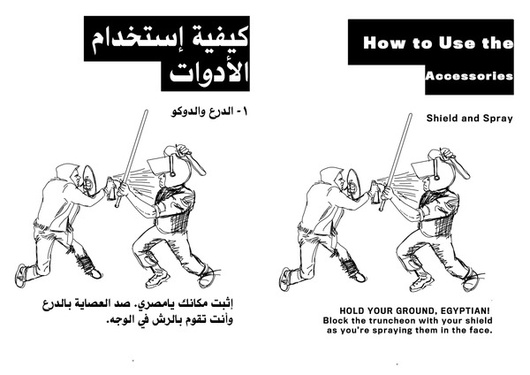
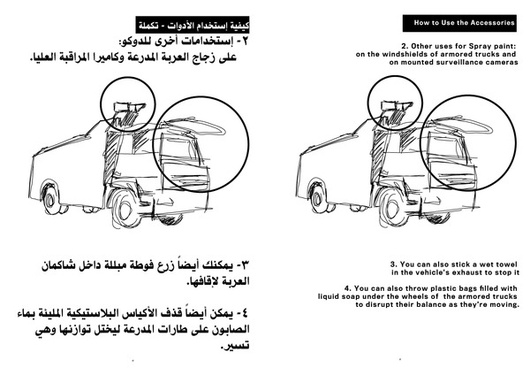
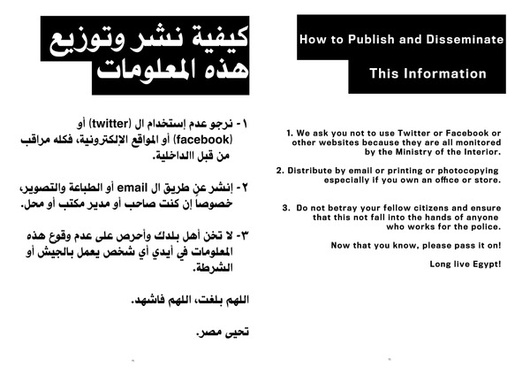 Revolution flag of Egypt 1919
Revolution flag of Egypt 1919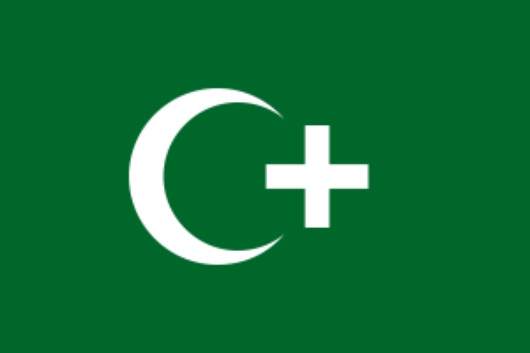 One previous model for recent upraising in Egypt is what Egyptians havealways
called the "Revolution of 1919", though many English histories follow
the British colonial usage and call it an uprising. Like 2011, 1919 had
no clear leadership and was largely a genuine popular uprising. It had
its own flag, with the crescent and the cross to show both Muslims and
Copts supported it, a symbol has be seen occasionally also recent
demonstrations.
One previous model for recent upraising in Egypt is what Egyptians havealways
called the "Revolution of 1919", though many English histories follow
the British colonial usage and call it an uprising. Like 2011, 1919 had
no clear leadership and was largely a genuine popular uprising. It had
its own flag, with the crescent and the cross to show both Muslims and
Copts supported it, a symbol has be seen occasionally also recent
demonstrations.Attitudes in Egypt
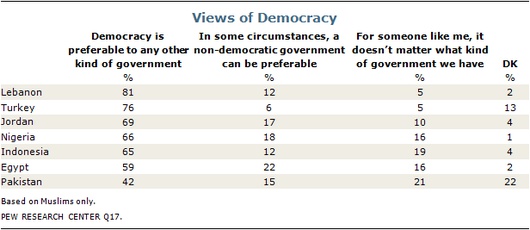 In a survey conducted April 12 to May 7, 2010, the Pew Research Center's
Global Attitudes Project examined the views of Egypt and six other
Muslim publics about politics and the role Islam should play in it. A
59%-majority of Muslims in Egypt believed that democracy was preferable
to any other kind of government. About one-in-five (22%), however, said
that in some circumstances, a non-democratic government could be
preferable, and another 16% said it did not matter what kind of
government is in place for a person in their situation. Besides
attitudes to different questions in Egypt the following tables include
also results in some selected countries where the same survey took
place: (Source: Pew Research Center publication )
In a survey conducted April 12 to May 7, 2010, the Pew Research Center's
Global Attitudes Project examined the views of Egypt and six other
Muslim publics about politics and the role Islam should play in it. A
59%-majority of Muslims in Egypt believed that democracy was preferable
to any other kind of government. About one-in-five (22%), however, said
that in some circumstances, a non-democratic government could be
preferable, and another 16% said it did not matter what kind of
government is in place for a person in their situation. Besides
attitudes to different questions in Egypt the following tables include
also results in some selected countries where the same survey took
place: (Source: Pew Research Center publication )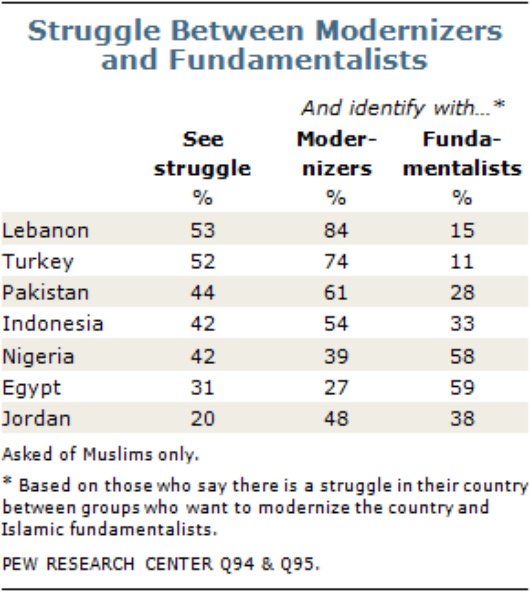
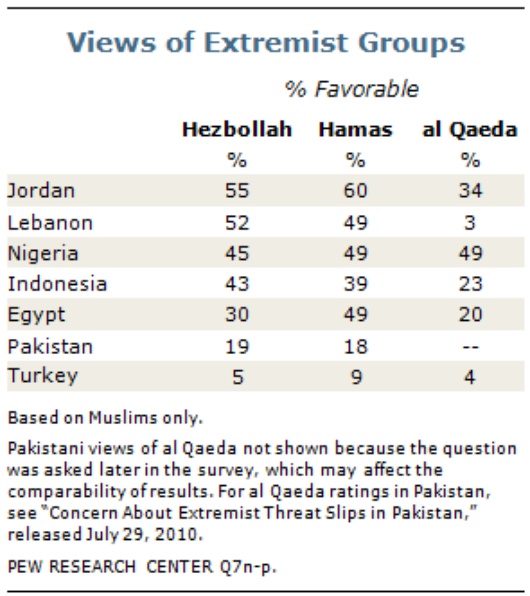
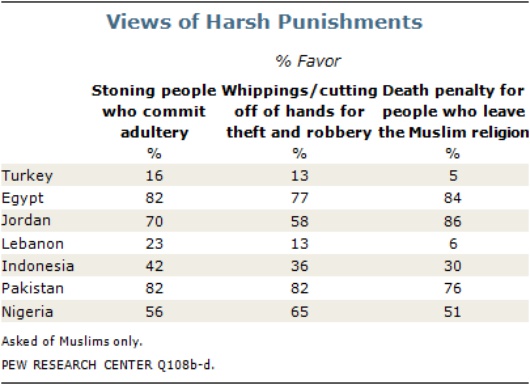
Hardliners exporting terrorism
The Gaza Strip was clearly an exporter of terrorism to Egypt before the current crisis began. Egypt's outgoing interior minister, and after him the Egypt media, accused the Army of Islam operating in the Gaza Strip of involvement in the mass-casualty suicide bombing attack at a Coptic church in Alexandria (January 2011, 25 killed and at least 80 wounded). Army of Islam operatives in the Gaza Strip were accused of directingThe Army of Islam emblem terrorist
activities in Egypt for Al-Qaeda and of contacting terrorist operatives
through the tunnels under the Egyptian-Gazan border (which, according
to the outgoing interior minister, threaten Egypt's national security).
The Army of Islam was also accused of involvement in other terrorist
attacks carried out in Egypt in recent years, including one in the El
Khalili bazaar in Cairo which killed a woman tourist from France
(February 22, 2009).Various jihadist-Salafist networks affiliated with
Al-Qaeda thrive in the Hamas-controlled Gaza Strip. The Army of Islam
(Jayish al-Islam), established in 2006, is one of the most prominent. It
-temporary - later joined by operatives of the Izz al-Din al-Qassam
Brigades, Hamas' military wing. Another
example of internal Arab terrorism with roots in the Gaza Strip was the
exposure of a terrorist network in Morocco. In June 2010 an eleven-man
cell of Moroccans from Casablanca, Azjlal (in the Atlas mountains) and
Oujda (in eastern Morocco), as well of Palestinians, was exposed. The
cell was headed by Yahya al-Hindi, aka Abu Qutada al-Shami, a
Palestinian from the Gaza Strip. He had previously been a Palestinian
Islamic Jihad operative and was influenced by Al-Qaeda's ideology. (
Source: The Meir Amit Intelligence and Terrorism Information Center )
terrorist
activities in Egypt for Al-Qaeda and of contacting terrorist operatives
through the tunnels under the Egyptian-Gazan border (which, according
to the outgoing interior minister, threaten Egypt's national security).
The Army of Islam was also accused of involvement in other terrorist
attacks carried out in Egypt in recent years, including one in the El
Khalili bazaar in Cairo which killed a woman tourist from France
(February 22, 2009).Various jihadist-Salafist networks affiliated with
Al-Qaeda thrive in the Hamas-controlled Gaza Strip. The Army of Islam
(Jayish al-Islam), established in 2006, is one of the most prominent. It
-temporary - later joined by operatives of the Izz al-Din al-Qassam
Brigades, Hamas' military wing. Another
example of internal Arab terrorism with roots in the Gaza Strip was the
exposure of a terrorist network in Morocco. In June 2010 an eleven-man
cell of Moroccans from Casablanca, Azjlal (in the Atlas mountains) and
Oujda (in eastern Morocco), as well of Palestinians, was exposed. The
cell was headed by Yahya al-Hindi, aka Abu Qutada al-Shami, a
Palestinian from the Gaza Strip. He had previously been a Palestinian
Islamic Jihad operative and was influenced by Al-Qaeda's ideology. (
Source: The Meir Amit Intelligence and Terrorism Information Center )Israel's security concern
PM Netanyahu's early comments were supporting Mubarak, but few days later statements from Israel were moderated more towards understanding the need to replace him. President Obama publicly sided with the protesters' cause, but is secretly helping the army play for time and keep Mubarak going for the interim; now also Israel and its intelligence have joined the effort. Israel's early support for Mubarak was probably based on fear that Mubarak's regime will be replaced with Islamist regime, he anyway was capable of keeping the Muslim Brotherhood in its place. Israel may have hard experiences about Brotherhood's activities in Gaza strip, however the views in this organization are not one to one with those among Iran's ayatollahs. Israel assumed that its victory in 1967 had improved its national security. First, it provided Israel with strategic depth, which it never had before. An attack by its neighbors, particularly Egypt and Syria, would first be fought outside of Israel. On 1973 Israel was forced to revise its
overconfident position as happened what the Israelis call the Yom Kippur
War and the Arabs call the Ramadan War. Just six years after their 1967
defeat, the Egyptians mounted a two-army assault across the Suez,
coordinated with a simultaneous Syrian attack on the Golan Heights. Even
more stunning than the assault was the operational security the
Egyptians maintained and the degree of surprise they achieved. One of
Israel’s fundamental assumptions was that Israeli intelligence would
provide ample warning of an attack. And one of the fundamental
assumptions of Israeli intelligence was that Egypt could not mount an
attack while Israel maintained air superiority. Both assumptions were
wrong. But the most important error was the assumption that Egypt could
not, by itself, coordinate a massive and complex military operation. In
the end, the Israelis defeated the Egyptians, but at the cost of the
confidence they achieved in 1967 and a recognition that comfortable
assumptions were impermissible in warfare in general and regarding Egypt
in particular.
The Egyptian recognition that its interests in Israel were minimal and
the Israeli recognition that eliminating the potential threat from Egypt
guaranteed its national security have been the foundation of the
regional balance since 1978.
outside of Israel. On 1973 Israel was forced to revise its
overconfident position as happened what the Israelis call the Yom Kippur
War and the Arabs call the Ramadan War. Just six years after their 1967
defeat, the Egyptians mounted a two-army assault across the Suez,
coordinated with a simultaneous Syrian attack on the Golan Heights. Even
more stunning than the assault was the operational security the
Egyptians maintained and the degree of surprise they achieved. One of
Israel’s fundamental assumptions was that Israeli intelligence would
provide ample warning of an attack. And one of the fundamental
assumptions of Israeli intelligence was that Egypt could not mount an
attack while Israel maintained air superiority. Both assumptions were
wrong. But the most important error was the assumption that Egypt could
not, by itself, coordinate a massive and complex military operation. In
the end, the Israelis defeated the Egyptians, but at the cost of the
confidence they achieved in 1967 and a recognition that comfortable
assumptions were impermissible in warfare in general and regarding Egypt
in particular.
The Egyptian recognition that its interests in Israel were minimal and
the Israeli recognition that eliminating the potential threat from Egypt
guaranteed its national security have been the foundation of the
regional balance since 1978. To be continued: revolts, reforms, coups, revolutions...?
 Situation
in Egypt is so appalling that a military takeover of the regime is a
serious future scenario. This is no new idea - in 1952, Col. Gamal Abdel
Nasser staged a military coup that displaced the Egyptian monarchy,
civilian officers in the military, and British influence in Egypt.
Nasser created a government based on military power as the major
stabilizing and progressive force in Egypt. His revolution was secular
and socialist. On Nasser’s death, Anwar Sadat replaced him. On Sadat’s
assassination, Hosni Mubarak replaced him. Both of these men came from
the military as Nasser did.
Thinking
different scenarios forward so first one could be that the regime might
survive with or probably without Mubarak. Under the same scenario there
may be a coup of the army staff. A second possibility is that the
demonstrators might force elections in which ElBaradei or someone like
him could be elected and Egypt might proceed on the path of democracy.
The third possibility is that the demonstrators force elections, which
the Muslim Brotherhood could win and move forward with an
Islamist-oriented agenda. And then there is a possibility that Egypt
will sink into political chaos.Egypt's
society is diverse enough to withstand a despotic theocracy and if in
doubt so the army is the final guarantor. Sustainable significant change
requires a new political structure, as well as a new process that
ensures free and fair elections and adequate opportunities for popular
participation. Real democracy must be substantive as well as procedural,
bringing human security to the people, including basic needs, decent
work, and a police that protects rather than harasses.
Situation
in Egypt is so appalling that a military takeover of the regime is a
serious future scenario. This is no new idea - in 1952, Col. Gamal Abdel
Nasser staged a military coup that displaced the Egyptian monarchy,
civilian officers in the military, and British influence in Egypt.
Nasser created a government based on military power as the major
stabilizing and progressive force in Egypt. His revolution was secular
and socialist. On Nasser’s death, Anwar Sadat replaced him. On Sadat’s
assassination, Hosni Mubarak replaced him. Both of these men came from
the military as Nasser did.
Thinking
different scenarios forward so first one could be that the regime might
survive with or probably without Mubarak. Under the same scenario there
may be a coup of the army staff. A second possibility is that the
demonstrators might force elections in which ElBaradei or someone like
him could be elected and Egypt might proceed on the path of democracy.
The third possibility is that the demonstrators force elections, which
the Muslim Brotherhood could win and move forward with an
Islamist-oriented agenda. And then there is a possibility that Egypt
will sink into political chaos.Egypt's
society is diverse enough to withstand a despotic theocracy and if in
doubt so the army is the final guarantor. Sustainable significant change
requires a new political structure, as well as a new process that
ensures free and fair elections and adequate opportunities for popular
participation. Real democracy must be substantive as well as procedural,
bringing human security to the people, including basic needs, decent
work, and a police that protects rather than harasses. 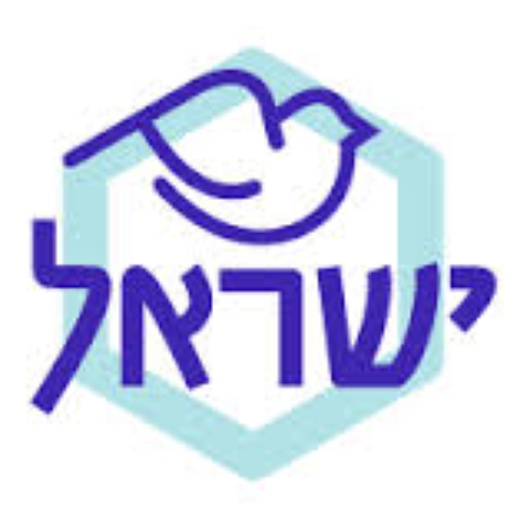 In my opinion the outcome in Egypt and maybe in other Arab countries in near future will be a reform not revolution,
that is, changes in personnel and policies, protection of human rights,
but no challenge to the structure or the constitution. I am afraid so
but the events so far are giving hope that surprises are also possible.
In my opinion the outcome in Egypt and maybe in other Arab countries in near future will be a reform not revolution,
that is, changes in personnel and policies, protection of human rights,
but no challenge to the structure or the constitution. I am afraid so
but the events so far are giving hope that surprises are also possible.Geopolitical outcome
For radical Islam a radicalized Egypt could give a great boost even if Islamist Egypt would not be an Iranian ally. However for the United States, an Islamist Egypt would be a strategic catastrophe. Also Israel would be endangered. Israel’s national security has rested on its treaty with Egypt. The demilitarization of the Sinai Peninsula not only protected Israel’s southern front, it meant that the survival of Israel was no longer at stake. In all of the wars Israel fought after its treaty with Egypt (the 1982 and 2006 wars in Lebanon) Israeli interests, but not survival, were at stake. Islamic Egypt would bring a multi-front war again on the table. If the military regime retains power the geopolitical arrangements would remain in place, except in case where new regime must get popularity by So
the Western governments could be more afraid of the arrival of
democratic institutions in the Middle-East than of military stable
dictatorships. Anyway the outcome doesn’t depend on what the European
Union, Tehran or Washington says so let's give the stage to locals.
So
the Western governments could be more afraid of the arrival of
democratic institutions in the Middle-East than of military stable
dictatorships. Anyway the outcome doesn’t depend on what the European
Union, Tehran or Washington says so let's give the stage to locals.


